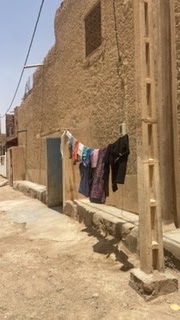blog 3: gender roles
Before this trip, I had a preconceived notion of how women were treated in this country, and I must
admit that my assumptions have proved to be very wrong. Reality seems to be closer to the opposite.
I assumed that women were deliberately treated unfairly and poorly by their male counterparts,
and that they lacked rights that many women in America don’t even think twice about.
I have since come to realize that is not the case, and I’ve learned so much in regards to the roles and
relationships of men and women here.
When I first noticed that men were predominantly the ones out on the sidewalks and sitting
outside of cafes, I perceived that negatively. I assumed that was unfair for the women, and I
saw the men in a bad light. I thought the men wanted them to stay cooped up in the house.
My western way of thinking was quick to jump to sexism and deliberate inequality, but I now
know those things aren't the case. I learned that the home is considered to be the woman's
sacred place, called Harem, in Islamic faith. Everything in the house is hers, and everything
outside the house is the husband’s. Because the house is her sacred place, she has the right
to tell her husband to leave whenever she wants. Before understanding the context,
my western way of thinking was quick to jump to sexism and deliberate inequality, but I now
know those things aren't the case. I think these thoughts were also based on a generalized
assumption I had of men and women living in Arab countries. The reality is because in the
dominant religion (Islam), the roles of men and women are just different than what I’m used
to, and that’s just part of the culture and way of life here, which I find fascinating! In the old Moroccan
religion, a man could not be in the presence of a woman whom he did not know. Men and women were
not allowed to be strangers amongst each other. Now days, even with the strong existence of tradition, that
rule has begun to be obsolete (Huraizi).
Based on my past knowledge of Islamic nations, and comparison of where I’m from, I placed Morocco in an identity group completely different from reality. I thought the social values were in disregard to gender equality. Social Identity theory says that humans classify themselves and others in social categories, and history of the relationship between social identity groups in society at large within past conflict plays a role (Leading Across Differences).
Schwartz, S. (2010) Cultural values. In K. Hanum, B.B. McFeeters & L. Booysen (Eds.), Leading across differences (p. 115-123). Pfieffer.
https://www.quora.com/Why-are-there-only-men-at-the-coffee-shops-in-Morocco



Great blog post! I also place Moroccan's in an identity group based upon social stigmas and learned stereotypes. I too believed that the women were being shut away from society and it wasn't until Hamid said that the women were the ones who could kick the men out of the house during the day, that I realized how wrong I was. This relates directly into Social Identity Theories and our fear of the unknown that makes us have poor assumptions about others.
ReplyDelete